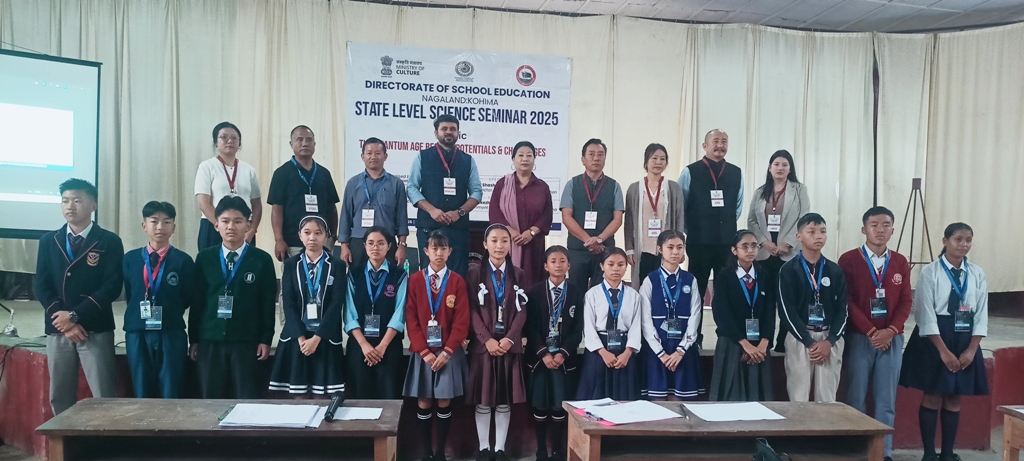FRIDAY, OCTOBER 10, 2025
- Home
- State-Level Science Seminar 2025 held at TMGHSS Kohima
State-Level Science Seminar 2025 held at TMGHSS Kohima
Directorate of School Education organises State-Level Science Seminar 2025 in Kohima.
Share

KOHIMA — The State-Level Science Seminar 2025 organised by the Directorate of School Education (DoSE), was held on Friday at TM Government Higher Secondary School (TMGHSS), Kohima, on the theme ‘The quantum age begins: Potentials and challenges.’
Principal Director of School Education, Shashank Pratap Singh, the special guest of the event, in his speech, congratulated the district winners of the science seminar and encouraged them to compete among each other with healthy spirit to win the state-level seminar.
Informing that that the winning team of the state-level seminar will go to Bengaluru, Singh advised the students to look to the bigger picture, aligning with the Government of India's vision to make India a developed nation by 2047.
He highlighted the crucial role of science education, science, and technology in making India a knowledge hub, paving the way for the country's development by 2047.
Also read: Phusachodu’s ‘Village Fair’ showcases local produce
He also informed that various science-related activities are being conducted in schools, as part of the Government of India and Government of Nagaland’s initiative to promote science education.
He implored upon the students to follow their inner calling and not study for the sake of getting degree, while also advising students taking up science to look beyond the traditional science combination — PCM or GDC — adding that there are many other new combinations such as microbiology, biotechnology, nuclear medicine, quantum physics, quantum mathematics.
Further, pointing out to the recent Nobel Prize 2025 announcements in physics, chemistry, and medicine, which recognised groundbreaking work in quantum technology, quantum metal interactions, and immunity-related research, Singh encouraged students to seek guidance from their science teachers and pursue their passions and inner callings.
Theme speaker Neikezhapfȕ Dzȕvichȕ, PGT (Physics) at TMGHSS, explained that smartphones and computers people use daily for chatting, watching videos, or navigating the world all rely on the principles of quantum mechanics, a branch of science that describes how tiny particles behave in surprising and unconventional ways.
She highlighted that quantum mechanics, which emerged in the early 20th century, revealed that the microscopic world follows rules very different from those governing everyday life. Tiny particles can exist in multiple states at once — a phenomenon known as superposition — and can also be entangled, meaning that what happens to one particle instantly affects another, regardless of distance.
“These ideas were once just curious theories, but today they form the foundation of a new kind of technology called quantum technology,” she said.
Dzuvichü explained that quantum technology harnesses these principles to create powerful tools capable of revolutionising computing, sensing, and communications which offers features unachievable through conventional machines based on classical physics.
She remarked, “Imagine a world where computers solve problems in seconds that would take today’s fastest supercomputers thousands of years; communication so secure that no hacker can break through; and sensors so precise they can revolutionize medicine and navigation. This is not science fiction — it’s the dawn of the quantum age.”
She further pointed out that the significance of this new era was underscored when the United Nations declared 2025 as the International Year of Quantum Science and Technology, aimed at raising global awareness about the impact of these advancements.
However, she also cautioned that with such great potential come significant challenges, stressing the need to develop quantum technology responsibly to ensure it benefits everyone safely.
“As the world progresses, it is important for us to stay in tune with the latest knowledge. Learning about quantum science and its effects can help us grow as thoughtful individuals who can shape a better and safer future with this amazing technology,” she said.
Earlier welcome address was delivered by Avino Tase, Deputy Director, DoSE.
Participants from 17 districts took part in the competition.
Results of state-level science seminar
First- Ejonthung Odyuo, Mt. Hermon HSS, Konima.
Second- Sadiya Parveen, El. Beth High School, Kiphire
Third- Elisen C Yanthan, Perennial School Wokha

